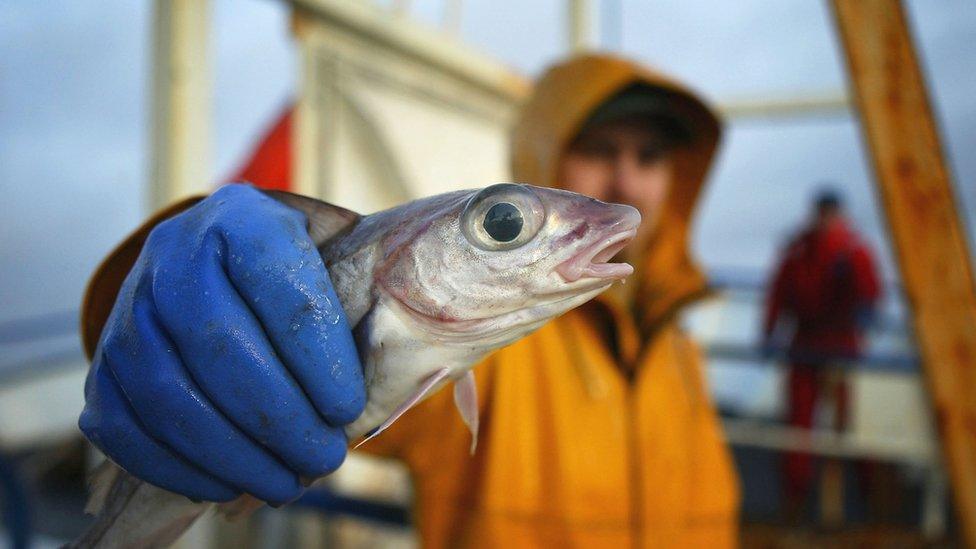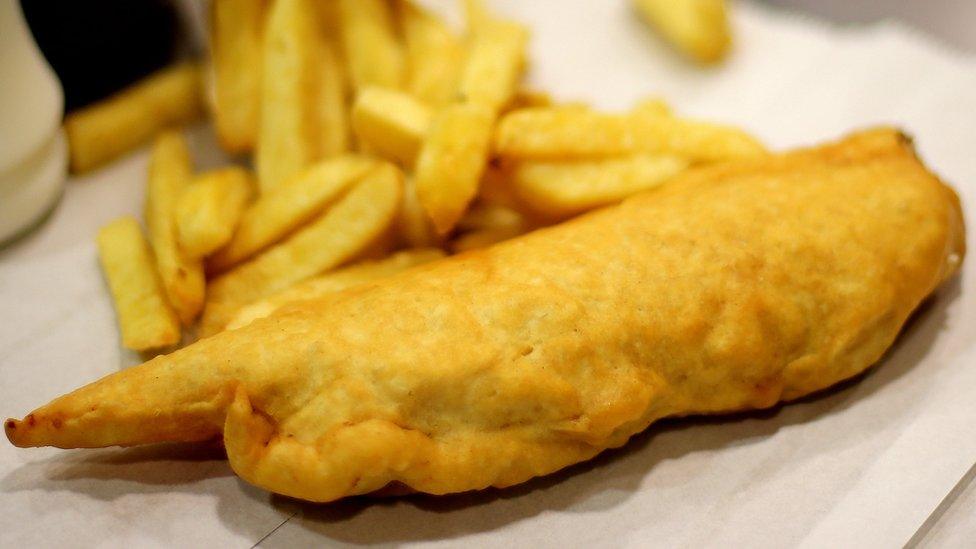Conservation group backs Scottish North Sea haddock
- Published
- comments

An international conservation body has given its backing to Scottish North Sea haddock after it was taken off a list of sustainable "fish to eat".
The Marine Conservation Society (MCS) downgraded the fish on its Good Fish Guide, external after stock numbers fell.
But The Marine Stewardship Council (MSC), which certifies the sustainability of fish and seafood, contradicted the MCS advice.
It insisted consumers can enjoy haddock suppers with a "clear conscience".
Haddock from three North Sea and west of Scotland fisheries is no longer on the MCS's recommended "green" list of fish to eat.
They were downgraded because stock numbers in 2016 were below the recommended level and action was needed to increase the number of fish at breeding age.
'Responsible fishermen'
But the MSC, an international body set up to protect fish stocks, praised Scottish fishermen and insisted North Sea haddock was being fished sustainably.
Its spokesman James Simpson said: "The Scottish haddock fishery is still MSC certified due to the strong management they have in place to deal with changing stocks.
"The Scottish haddock fishermen have already worked with the government to set lower quotas in response to the latest scientific advice. In fact they've set their catches even lower than the recommendations. It's a bold move to protect the haddock stock for the long term.
"This is a great example of a responsible reactive management responding to fluctuations in stock status and that's exactly what MSC certification is about: long-term sustainability. You can still choose MSC certified Scottish haddock for your Friday night fish and chips with a clean conscience.
"I'll be choosing MSC labelled Scottish haddock tonight for my fish and chip supper knowing that it's been caught by responsible fishermen with sustainable management that's been checked and monitored by the world's most rigorous scientific test of sustainability."

The Scottish Fishermen's Federation said people can continue to buy their fish suppers "without worrying" about fish stocks
The MCS's Good Fish Guide now rates two North Sea haddock fisheries as "amber" - scoring four on a scale of one to five, where one is the most sustainable.
Haddock from the west coast fishery has dropped from being a good choice (rated two) to one to eat only occasionally (rated three).
Bernadette Clarke, manager of the MCS Good Fish Guide, said: "These ratings changes have come about because scientific perception of the stock has changed.
"Compared to 2015, the stock numbers in 2016 were below the recommended level and at the point where action is now needed to increase the number of fish of breeding age."
She told BBC Radio Scotland's Good Morning Scotland: "There's no suggestion that fishermen should stop fishing, taking fish from these areas, but there is a scientific recommendation to reduce the amount of catches taken from these areas in 2017."
Haddock is one of the "big five" seafood species, along with cod, tuna, salmon and prawns. But Ms Clarke suggested that consumers looking for an alternative to haddock should try coley, whiting or hake.


Top five fish to avoid
Seabass from the central and south North Sea, the Irish Sea, English Channel, Bristol Channel and Celtic Sea. The MCS say it is overfished.
European Eel from the north-east Atlantic is critically endangered.
Atlantic Salmon from the north-east Atlantic, where it is a threatened and declining species.
Southern Bluefin Tuna has been heavily overfished around the world in the past. The International Union for Conservation of Nature says it is critically endangered.
Uncertified prawns (king) from uncertified farms, which cause environmental damage through poor regulations and big disease outbreaks.
Source: Marine Conservation Society

Bertie Armstrong, the chief executive of the Scottish Fishermen's Federation, criticised the MCS and claimed the move to downgrade the fish would lead to confusion among consumers.
He told BBC Radio Scotland that North Sea and west coast haddock is being caught sustainably and within a quota which has been reduced.
"The stock is not threatened, the stock is caught sustainability and the real perversity of this is that this advice, this lightweight, thoughtless advice from the Marine Conservation Society could lead to actually discarding at retail level," he said.
"What it's saying to the consumer is leave this lying on the fishmonger's slab, don't pick it up.
"That will cause it to go in the skip at the back of the supermarket if anybody pays attention to this, so it's irresponsible. It's genuinely irresponsible."